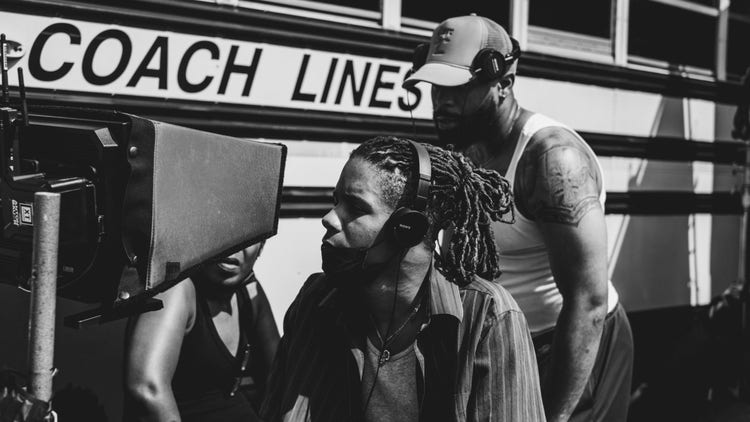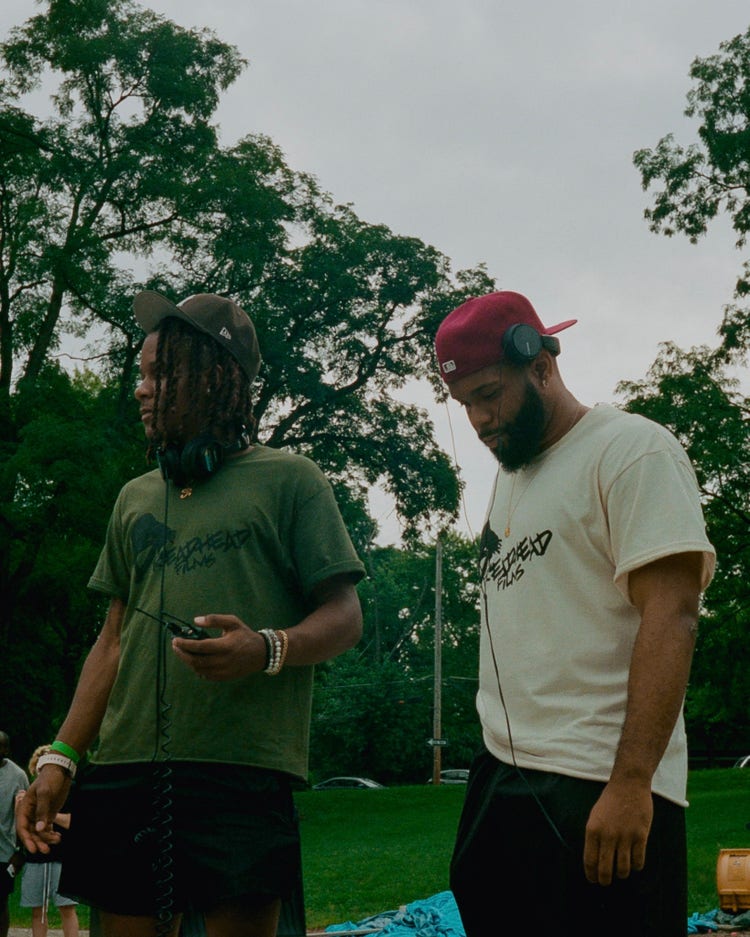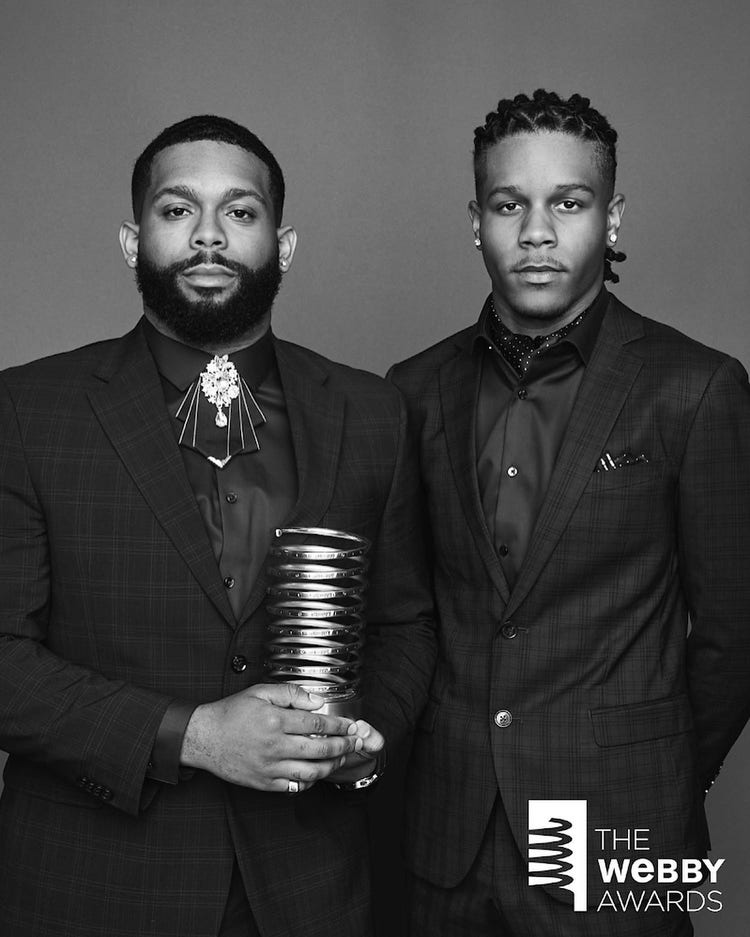7 filmmaking tips to take you from pitch through post-production with Julien and Justen Turner

When most kids were home from school on summer break, playing outside or lounging around the house, Julien and Justen Turner were making short films.
Growing up as teenagers in suburban Ohio, Julien and Justen didn’t have much of a film community to get involved with, or even older filmmakers to look up to as mentors. What they did have was a sense of drive, a supportive family, and each other — which turned out to be a winning combination. To date, they’ve made short films for Nike, Adidas, other major brands (they were even commissioned to create a video for Sesame Street!), were named to Forbes prestigious 30 Under 30 List, and now they’re helping aspiring young filmmakers throughout the production process with their best film production tips.
An early start
“Our parents were both musicians, so they wanted to instill some artistic skill in us,” Justen says. Their parents made an annual Christmas video each year that featured the brothers playing music, but they soon realized that Justen and Julien were more interested in the video itself than the musical component. “Our parents then began investing that time and energy into our video interests, which allowed us to get started making films.”

After making a few early short films with friends as teenagers, the brothers began to think of other ways to get more exposure and experience with filmmaking (which, in the Midwest, away from the film scenes of areas like New York or Los Angeles, takes a bit of creative thinking). “I made a pitch to the high school football team that Julien played for, and they ended up hiring us,” Justen remembers. “This was when I was 12 or 13, and it was actually kind of crazy because looking back at it, I don't know how they could have trusted some little kid.” That first paid gig bought the brothers their first real camera, which opened a whole new world of opportunity. “That was really how we got started as a business, and we reinvested everything into our independent short film ideas.”
Justen and Julien decided to name their film company Dreadhead Films, after the remake of The Karate Kid with Jaden Smith. “That was the first time we saw somebody that looked like us on a worldwide blockbuster,” Julien remembers. “He had his Afro and his braids and stuff, and Justen grew his hair out and began to grow dreads.”
Filmmaking — By any means necessary
Having a steady income stream from making athletic videos allowed the Turner brothers to continue to pursue their passion for making films. “All these people came to the football games and saw Dreadhead Films when they would watch our game recaps,” Julien says. “Some of them were business owners, and they would reach out to us to do their commercials and ads, then we would take that money and make a film and submit it to a festival.”
Within a few short years — though still only teenagers — the brothers were offered their first major gig: shooting short films for the 50th season of Sesame Street. “We kind of took off from there,” Julien remembers. “We continued to shoot films even through college, every break, over the summer, spring break, and eventually our clients grew.”
Julien took an internship as a content creator for Adidas as a way to bridge his past sports experience with a newfound interest in fashion. From there, he gained the connections to land them jobs shooting commercials for Nike and Air Jordan — for the past two years, they've shot numerous commercials for each. In between, they also shot a short film for brands like Beats by Dre and gained connections with their filmmaking heroes like Nate Parker and Spike Lee.

After years of hard work teaching themselves the ins and outs of film production, in 2023, the Turner Brothers were recognized on the Forbes 30 Under 30 list for their work building Dreadhead Films. “We've been hitting the ground running ever since,” Julien laughs.
Top tips to nailing the production process from start to finish
- Make the most of where you are.
“When we first started, we had no connections,” Julien says. “Nobody in our family is in the film industry, we were in the Midwest, you're isolated and it feels like there's no way in. We kind of had to make our way and learn the ropes.”
- Do what you can with what you’ve got.
For Justen and Julien, having access to the internet made it feel like they had a whole community of aspiring filmmakers to look up to. “For a good amount of time, it was just us and YouTube and movies, but luckily this was at the start of the internet when things were growing,” Julien says. “It didn't feel like it was a dead end — it felt like there were a lot of opportunities to get into filmmaking.”
- Use your network.
“Early on, we were in the Midwest, and you really didn't have much access to anything,” Justen says. “I would call our friends and work on casting and the whole performance of it all. We would go to our neighbors and our friends and we would be like, ‘Yo, you want to be in a movie?’”
- Learn to do every role.
“At first, we didn't have a cinematographer, so Justen was our cinematographer,” Julien remembers. “We didn't know what roles we were covering, and what they were called. Over time, we started to realize, ‘Oh, we need a camera operator, a cinematographer’, or ‘It's called being an art director, or production designer,’ things like that. We sharpened our tools across the board.”
- Tap into your natural talents.
While the brothers co-direct their projects, they share responsibilities based on their unique skills and interests. “We have a different angle of the same vision,” Justen says. “Julien is very focused on the physical, so the set design, the actors and the people. And I'm kind of focused on how it looks on camera. We both have the ability to take over when need be should the other need to sit back and pay attention to details.”
- Find the tools you need to succeed.
The brothers credit their dad for buying them Premiere Pro and encouraging them to learn how to take their films to the next level. Similarly, their mother had used Photoshop for graphic design work, and she taught them to use the program to create moodboards for their films. Today, they continue to use the same programs, along with After Effects for animation and InDesign for building decks during pre-production. Julien also uses Adobe Acrobat when writing scripts.
- Most importantly… just get started.
“It is a daunting process, and people are intimidated by others' projects and why theirs doesn't look like those, but we really want to encourage people just to get started and just do it. We didn't go to school. We didn't have any tutorials. We just made a film. We made a bunch of bad films. Eventually, they got better and better. That's really what we just want to encourage people to do.”
Putting it into practice
We’re excited to partner with Justen and Julien and to share tips and tricks on the production process, questions to ask, and how to get started with your best foot — or film — forward. From pitching to pre-production, production, and into the post-production process, they’ve covered everything.
Check out all their best advice here:
As a leading sponsor of the Sundance Film Festival, Adobe is proud to champion all the incredible filmmakers whose creativity inspires us to empower storytellers everywhere with the tools and support to change the world. Get the latest from Park City and the Film Festival here.